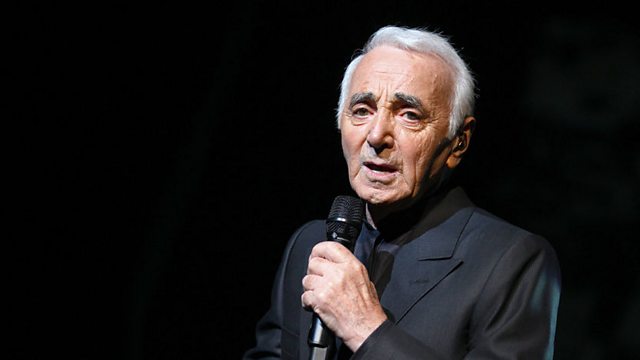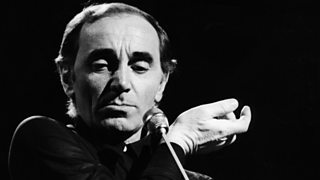
Bonjour Mr Aznavour.
Petula Clark profiles Charles Aznavour, one of the last great French chansonniers, who readers of Time magazine voted Entertainer of the Century.
Petula Clark profiles Charles Aznavour, one of the last great French chansonniers, who readers of Time magazine voted Entertainer of the Century.
From a heritage passed down through Piaf, Trenet, Chevalier and others, Charles has brought his own style to this unique musical tradition and in doing so raised it, and himself, to worldwide fame. After becoming Edith Piaf's protege, Charles went on to work with artists such as Liza Minnelli and Nana Mouskouri. His songs have been covered by Julio Iglesias, Bing Crosby, Fred Astair, Placido Domingo, Elvis Costello, Bob Dylan, Shirley Bassey, and Ray Charles.
Coming from a musical family, it was no surprise that Charles wanted a career on the stage, and he began at an early age, enrolling in stage school and performing as a child actor. But a chance hearing of Maurice Chevalier convinced Charles that he wanted to be a singer.
At first he performed as a duo with Pierre Roche and it was during this time he was spotted by Edith Piaf and publisher Raoul Breton. He and Pierre Roche toured with Piaf and the Compagnons de Chanson and later followed her to America.
He faced another struggle after deciding to go solo - he didn't look or sound like a star - but eventually, with songs like Yesterday When I Was Young and She, Charles cracked the US and UK markets. Not content with only singing, Charles has also continued with his first love of acting, appearing in more than 60 movies including Shoot the Piano Player and The Tin Drum.
Jean Cocteau once commented that "before Charles, despair was unpopular". He was referring to Charles' lyrics, and the fact that he rejected the traditional topics of chanson, and instead came up with his own, more realistic style. You've Let Yourself Go describes the brutal reality of an aging lover; What Makes A Man is the life of a transvestite; and I Have Seen Paris talks of war zones and Nazis occupation. It's also through his songwriting that we see how much he cares for his parents' country Armenia. They Fell describes the Armenian crisis of 1915 and Pour Toi Armenie was written after the 1988 earthquake.
It's also through his lyrics that Charles continues to be popular. Nana Mouskouri explains the continuing appeal of his songs to a younger audience. And, showing no signs of stopping, Charles explains that he "will be farewelling for a long time". The documentary from which this audio segment has been created first broadcast on Radio 2 in 2009.
Duration:
Credits
| Role | Contributor |
|---|---|
| Performer | Charles Aznavour |
This clip is from
Featured in...
![]()
麻豆社 Radio 2 Music Best Bits
Music Highlights from 麻豆社 Radio 2
![]()
Radio 2 Homepage Clips
The very best of the week's audio and video clips from 麻豆社 Radio 2.
![]()
Radio 2
The best clips from Radio 2


